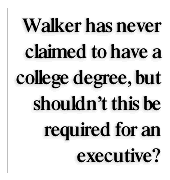Is Scott Walker Qualified To Be County Exec?
Rep. Scott K. Walker (R-Wauwatosa) was the first candidate to announce for county executive, and is widely considered one of the front-runners for the position. He has about $80,000 in his campaign fund war chest, he is expected to gain money from the state Republican Party, and he is an articulate, good-looking, media-savvy politician who will make a strong candidate. But he does not have a college degree.
 Walker has never claimed otherwise. “I’ve listed that I attended Marquette,” he says. Walker, 34, attended MU from 1986-1990. “I’m 15 or 16 credits short of a degree,” he adds.
Walker has never claimed otherwise. “I’ve listed that I attended Marquette,” he says. Walker, 34, attended MU from 1986-1990. “I’m 15 or 16 credits short of a degree,” he adds.
Should that matter? For the position of legislator or county board member, probably not. But this is an executive position, after all, running a $1 billion organization, the second largest government in Wisconsin. Wouldn’t a business of this size require a degree as well as some experience as a high level manager for any potential executive?
Walker won election to the state assembly in 1993 at the tender age of 25, and has had brief experience in the private sector. He worked for IBM selling warranties on computer systems and then went to the Red Cross, where he worked in marketing and then moved to a position as a development officer, sweet-talking businesses into underwriting or contributing to Red Cross.
Walker was picked by observers as a rising star in the legislature in 1998, in a Milwaukee Magazine story I did rating the legislators. This was just five years after he took office. “I think I’ve got an aggressive record of working with members of both parties,” he says.
Walker concedes he lacks executive experience but says “the job of county executive is to surround himself with competent administrators and project a vision. In the past, there hasn’t been a willingness to hire competent administrators.”
Given what a shambles was made of county government by Tom Ament, probably no one would have cared whether his opponent had graduated from high school. But Walker isn’t running against Ament. Opponents like Jim Ryan, former CEO of the Milwaukee Regional Medical Center, or Tyrone Dumas, who’s held administrative positions with Milwaukee County and Milwaukee Public Schools, have far more management experience.
Walker, however, paints himself as an interim executive who will help reform county government and lead the transition to a new form of government, with a smaller county board and an appointed county manager. Walker believes it will take six years to make the transition, and then he intends to move on. He says he does not have an interest in becoming the county manager, should that position be created.
Union leaders are likely to oppose Walker, for fear he will cut back the county social services safety net or attempt to privatize some government functions. But Walker says, “I think there are still fundamental programs at the county. You can’t get rid of the health care program, meal programs for seniors, and other programs.” As for privatizing, he says flatly, “that’s not my interest.” He adds that he does not intend to concede any votes, even to traditionally pro-Democrat groups like unions.
Walker, in short, will be a formidable candidate. But given the turmoil at the county, and the bad management that resulted in the pension controversy, opponents of Walker may argue someone with more executive experience is needed to overhaul this sinking ship.
The Governor Trips Again
Poor Scott McCallum continues to have his problems. The governor’s latest faux paus was to call a TV reporter a “dumb son of a bitch.” The Journal Sentinel story had a kind lead, suggesting it put him into “the major bloopers league with President Bush,” not bad company nowadays. As with Bush, the mistake is not likely to have a lasting impact, assuming McCallum stifles any further thoughts about the intelligence level of TV reporters (something many of us wonder about at times).
 McCallum’s bigger problems are far more substantial. His plan to cut revenue sharing for municipalities has managed to unite Milwaukee with cities like Green Bay, Rhinelander and La Crosse, something that almost never happens in Wisconsin. McCallum’s proposal opens the door for every mayor in Wisconsin, many of whom are Republicans, to blame him for cuts in essential services. McCallum’s handlers must be aware of how badly the plan is playing, for he has already been running commercials defending the proposal.
McCallum’s bigger problems are far more substantial. His plan to cut revenue sharing for municipalities has managed to unite Milwaukee with cities like Green Bay, Rhinelander and La Crosse, something that almost never happens in Wisconsin. McCallum’s proposal opens the door for every mayor in Wisconsin, many of whom are Republicans, to blame him for cuts in essential services. McCallum’s handlers must be aware of how badly the plan is playing, for he has already been running commercials defending the proposal.
Then there was McCallum’s performance in Washington, D.C., where he inexplicably declined to join those governors pushing Bush not to cut $8.5 million in highway funding for the states. This, of course, provided a huge opening for his Democratic opponents, including Congressman Tom Barrett, who pointed out that he is still fighting to get this money for the states. Barrett also charged McCallum seemed more concerned about Bush’s help with the governor’s million-dollar campaign fundraiser than with getting money to help Wisconsin.
Given that Wisconsin ranks near dead last in per capita federal funding it receives, and given that the state’s budget problems are at least partly due to the wave of highway construction financed under Thompson-McCallum, the current governor’s lack of concern about the potential federal funding seems remarkable. You can expect that Democratic gubernatorial candidates will continue to criticize him (while providing few ideas of their own about how they would solve the budget problem), but it’s a lot easier to score hits when your Republican opponent seems so politically tone-deaf.
This article was originally published by Milwaukee World.
Murphy's Law
-
The Last Paycheck of Don Smiley
 Dec 17th, 2025 by Bruce Murphy
Dec 17th, 2025 by Bruce Murphy
-
Top Health Care Exec Paid $25.7 Million
 Dec 16th, 2025 by Bruce Murphy
Dec 16th, 2025 by Bruce Murphy
-
Milwaukee Mayor’s Power in Decline?
 Dec 10th, 2025 by Bruce Murphy
Dec 10th, 2025 by Bruce Murphy




















